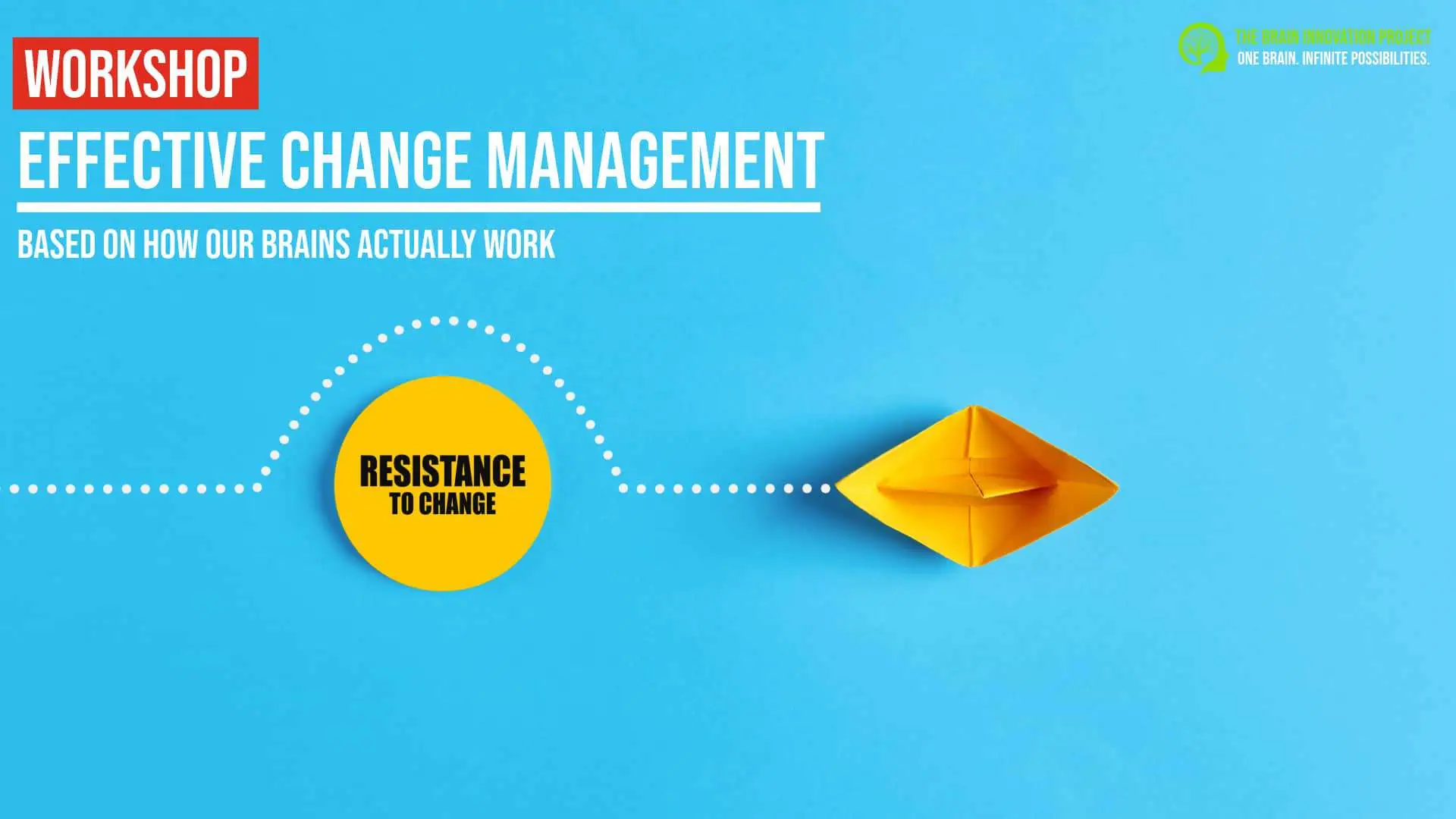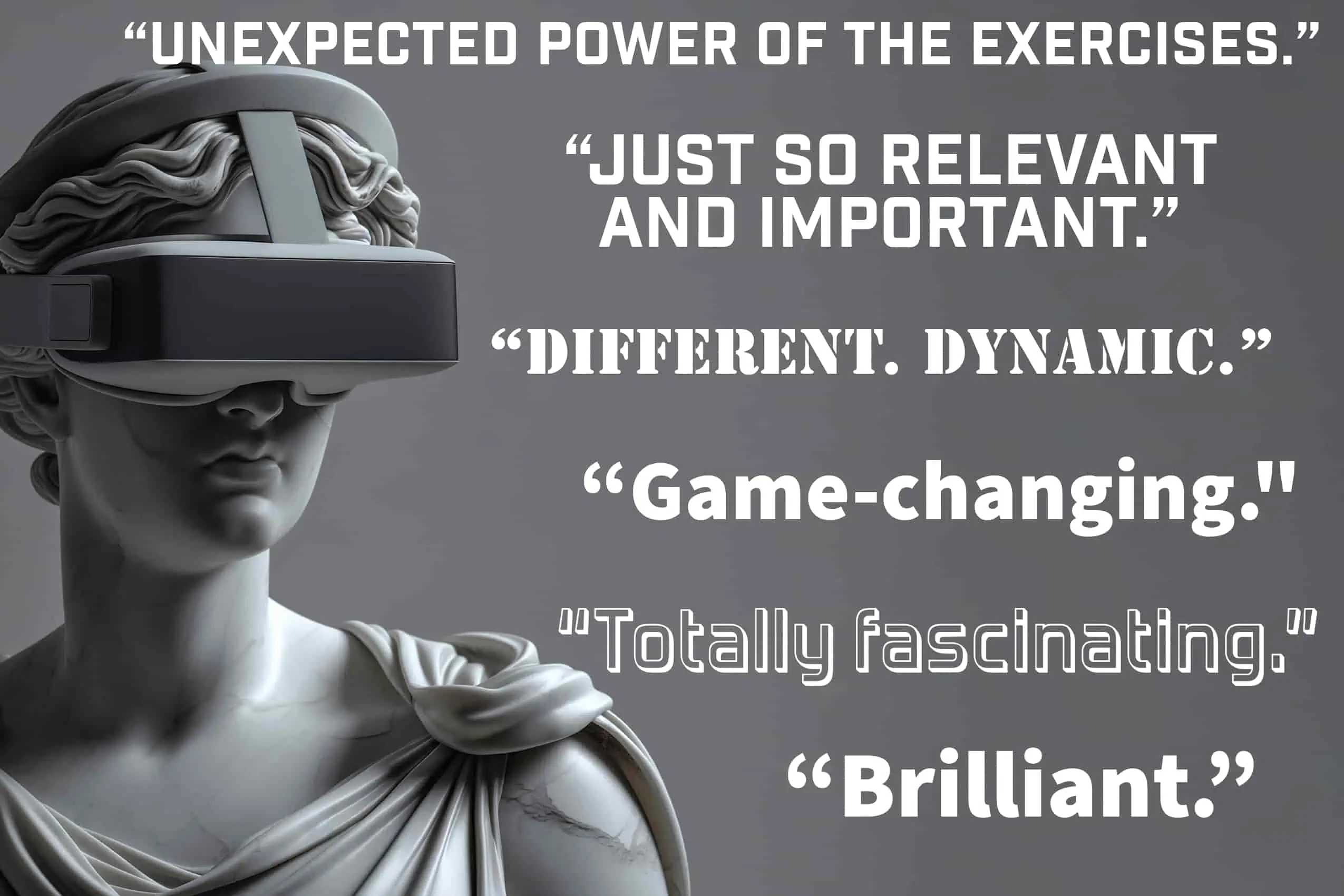Effective change management WORKSHOP

WHAT YOU WILL GET
- A deep understanding of how the brain makes sense of the world and the very real implications for leading change which brings people along
- The central importance of, and ability to, managing feelings and emotions while leading change
- The ability to rapidly enter a 'strategic mindset' on-demand and help others to do the same
- 'Anytime/ anyplace' tools and techniques to enhance innovation, creativity and imagination and encourage others to explore new options
- A wide-variety of practical tools and techniques for leading change and exploring new ways of thinking
- While the focus is on practice (tools), there is also an emphasis on the theory (brain) as to why and how the tools work
Overview
WHEN
This is offered as an in-house course or workshop.
WHERE
This is an in-person workshop. Short or introductory sessions can be done online.
DURATION
This can last from a few hours (introduction) to a week or an extended course.
Other
This can be combined with ongoing executive or leadership coaching.
SUMMARY

From Artificial Intelligence to the Climate Crisis, from shifts in geopolitical power to the changing world of work and from bio-engineering to populist politics, the world is experiencing rapid, profound and deep-seated upheaval. The issues are complex, multi-faceted and open-ended, with high degrees of uncertainty as to where things will end up.
These changes will effect everyone, whether they are currently aware of it or not. As such, those tasked with leading change, whether at the organisational, societal, cultural or political level, have a unique and critical role to play in helping bring others along and create a future which works for all of us.
Of course, these profound changes are not news in many ways, although their scope and impact are still wildly underestimated by many. As such, there are numerous excellent books, forecasters and institutions which are seeking to chart and understand the future. Yet, ultimately, the future we choose will be created in our brains, both individually and collectively. Our brain are not an ‘add-on’ or niche interest topic here. Rather, our brains are the place in which our understanding, actions, ideas, decisions – big and small – occur. They are also the place where we process our understanding of the past and aspirations for the future.
Understanding how they work – indeed what our brains really are! – has never been so critical as we seek to chart our path to the future. And, even more importantly, taking this knowledge and turning it into practical action. But this is exactly what you will get on this course.
CONTENT
NOTE
The below is illustrative as the precise contents included in the workshop will depend upon the length of time available, your needs and interests and target group.
OUR EMBODIED BRAINs and why they are important to understand
Although our experience of the world is our perceptions and thoughts, our brains do not exist in a vacuum. Rather, they are rooted in our bodies, culture, physical world and, most importantly, our deep evolutionary past. This has profound implications for understanding how and why they function the way they do. This introduction will explore:
- Dualist v naturalist understanding of our brains
- Brains in evolution
- Where our understanding of brains comes from (history, cognitive sciences, neurosciences, etc.)
- Basic neurobiology and functioning
The Sense Making Brain
We tend to think that we see the world objectively and are essentially rational beings. Neuroscience tells a different story. The underlying evolutionary purpose of our brains is not accuracy. Rather, it is to keep us alive. This has profound implications as to how we make sense of the world, with very practical consequences for leading change.
Here we explore:
- Sensory data: Interoception and exteroception
- Models/ Schema/ Representations of the world
- The role of individual and collective narratives in sense making
- Predictive Processing (aka. Predictive Coding), which is the main current framework or unified theory as to how brains work
EMOTIONS and FEELINGS
Whereas the study of ‘soft’ topics such as emotions and feelings were, until fairly recently, deemed unworthy of proper scientific attention, they are now recognised as being central in the way we make decisions. They are also critical to any credible strategy for leading effective and sustainable change, as to ignore them is to fundamentally misunderstand the people you are bringing with you.
Here we include:
- Definitions of feelings and emotions and positive and negative aspects
- Identifying and working with key emotions and feelings in leading change
- Tools and techniques to understand and reframe emotions and feelings
Imagination, Creativity and Strategic Thinking
All good leaders know the importance of being able to combine practical action and strategic thinking. But being able to switch between the two and, importantly, help others to be able to switch between the two, is not always easy. This is particularly the case when people are consumed by day-to-day tasks and strategic thinking is confined to retreats and away days.
Here we look at tools and techniques to bring strategic thinking into the everyday process, including:
- Automatic v deliberate thinking
- Spotlight (expertise/ narrow) v lantern (broad/ big picture) brain states
- Closing and opening cognitive loops
- Using imagination to forge new connections of existing knowledge
Agency, Motivation and action
Action is required for any change to occur, and this ultimately means activation of the sensorimotor system (all action is movement), whether this be around automatic behaviours or implementation of long-term cognitive strategies. This section builds entirely on all previous sections and includes:
- The deep link between perception, cognition and action
- The importance and systems of agency and motivation
- Linking action and higher cognitive functions
WHAT OTHERS SAY
The words we most often hear in feedback are 'surprising', 'fascinating' and 'practical', as people explore the world and their experiences through the lens of how their biological, physical brains work. Other feedback we have received includes:

